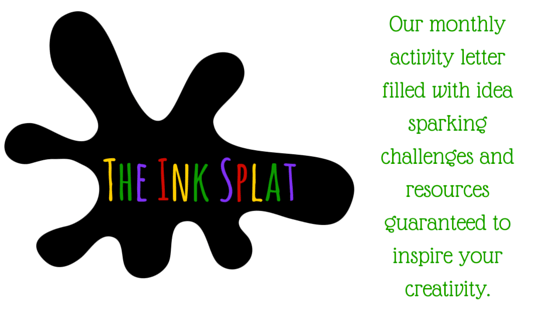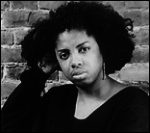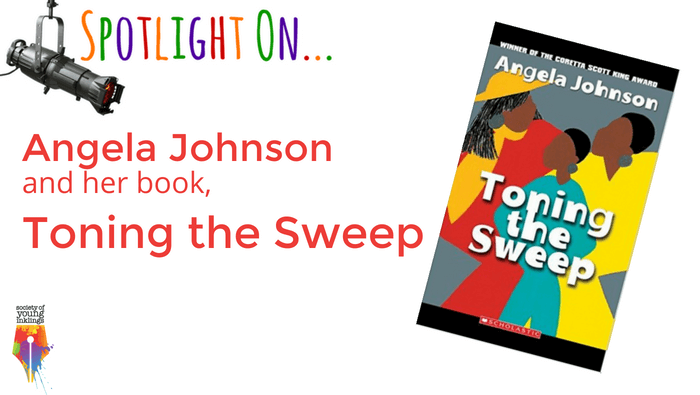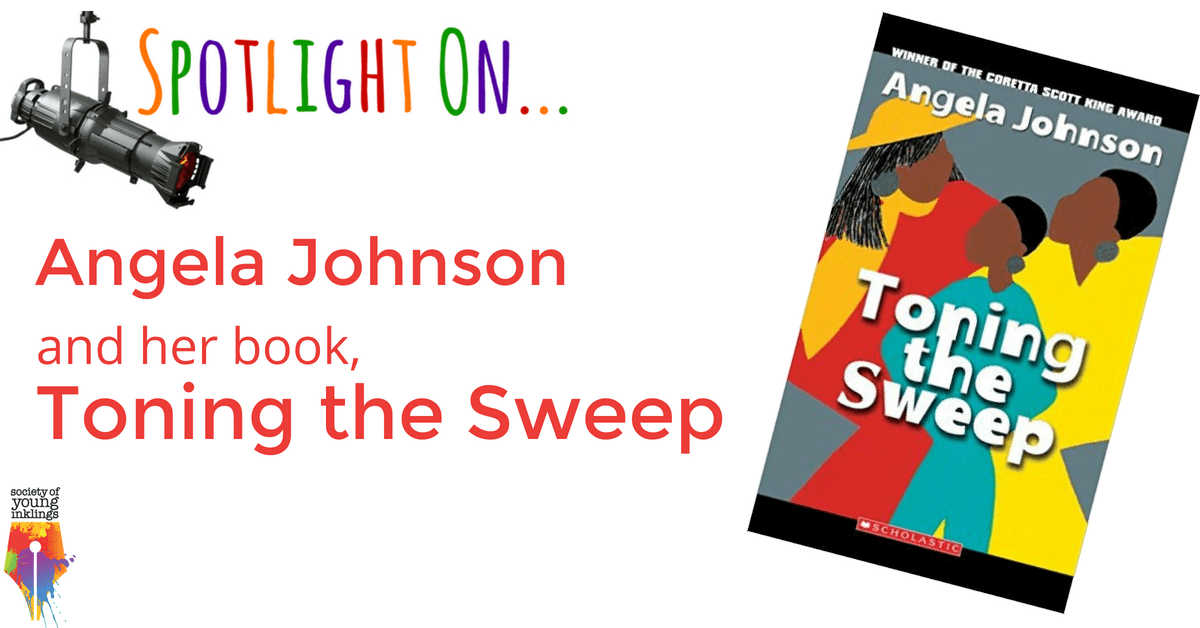
This month, we talk to award-winning author Angela Johnson. She shares with us her journey through writing different genres and the importance of reading.
As always, we’ve got a writing challenge for you, a fantastic interview, and some updates about Society of Young Inklings. Want to catch up? Check out last month’s Ink Splat here.
Writing Challenge
Look back at something you wrote last year, or a couple years ago. You might choose a journal entry, something you wrote for school, a note you wrote, or a story or poem. Use your past writing to time travel, to slip inside your own skin at a younger age. Try writing a story from this character’s point of view. You can write about a real circumstance, or an imagined one, but notice how you react differently than you might now. What’s different about this younger you? As you write, feel free to exaggerate this younger you into a fictional character if you like, one who might not be completely as you were. When you’re done, notice whether this approach–tapping into your own memories and personality–was a helpful way to create an authentic character.
We’d love to meet the characters you create. Submit your responses by emailing submit@younginklings.org and you might be published on our website!
An Interview with Angela Johnson
Your first several books were children’s picture books, then you switched to writing a mix of picture books, chapter books, young adult novels, and poetry. What prompted this switch? What draws you to each medium?
I guess you could call it a switch. When I began writing I truly only thought of children’s literature in the form of picture books. I was a bit embedded in these beliefs because at the time I took care of many small children in the college town where I lived.
But a wonderful thing happened when I began writing picture books; an amazing writer named Cynthia Rylant told me that she thought I had more to say—to older children. I was skeptical. I didn’t think I had it in me to write anything longer than a picture book or poem. One day she left a copy of a YA novel called Weetzie Bat on my doorstep. I read it in a couple of hours. It was spare and magical. I wanted to connect with any audience that would read that book.
Ultimately, for me, writing should not keep you static. I go where my creativity leads me. Lately, it has been picture books and a little poetry. I find if I try to force myself to write a novel, short story etc., it will not happen. So I go with the flow.
How has your writing process changed over time? Do you feel there are any big differences in your voice or creative process between your first novel, Toning the Sweep, and your most recent, A Cool Moonlight?
My writing process has not changed at all. I do not have a regular writing schedule.
I only write when I am truly inspired. I never try to force a story, but when I am inspired to write a novel I get up at a certain time of day and always try to write at least two or three chapters. I have done this from my first novel to the present ones.
I do think that the only thing that has changed is that it seems more difficult for me to get inspired these days. I have sparks of creativity. I used to have gushes. But I suppose a spark is better than nothing.
What do you think is the importance of writing children’s literature with African-American protagonists?
When I was a child, very rarely did you see children of color in any school or library. Anytime my school librarian got Ezra Jack Keats books she always beckoned me over and said, “I have a book for you”.
The children Ezra Jack Keats illustrated in his books looked like me, my friends, and the world around me. So when I began writing, I wrote about children who looked like me—but lived lives, had joys and fears and the universal experiences all children have. All I knew was that I wanted African-American children to see themselves in the world the same as I did when I was handed a book by my school librarian when I was seven.
It is so important for children of color to see non-stereotypical representations of themselves in everything from picture books, short stories, poetry, and novels.
When you are represented, your place in the world may have to be fought for—but not as hard.
Your writing is very character-driven. Which character of yours do you feel most connected to and why?
Yes, my books are character-driven. I have no talent for plotting—which I regret. Thus, I think I am more connected to Emmie in Toning the Sweep; the first teen character I ever wrote.
I actually read some of my high school journals when I was writing Toning the Sweep. There were so many actions or reactions Emmie took that I would have taken when I was her age. I was so comfortable with the character that I never had any doubts about her intentions, fears or her heart. Writing Toning the Sweep and the character of Emmie was exhilarating. I realized that I could really write a novel. It changed my world.
If you could tell your young writer-self something, what would it be?
If I could tell my younger writer-self something, it would be to do exactly what I did when I was younger: Read. Read. Read.
My dad had to actually ban reading at the dinner table in our house when I was a kid. He would be reading the paper, me autobiographies, my mom novels, and my brothers comic books and novels. No one talked to each other but our library cards
were well used.
I cannot stress how important reading is to a writer. When you are a young, avid reader you begin to understand voice and sense of place. You also get a sense of worlds so different from your own. You may also get a true sense of your own world. And really, isn’t that what all of this is about—understanding?
Society of Young Inklings News

- Summer is a perfect time to tackle your writing passion projects. During the school year, you’re guided in a learning journey by teachers. In the summer, you’ve got the opportunity to take the lead and follow your curiosity. Where will your curiosity lead you? We want to support you as you find out. From mentorships to writer’s circles, to online courses, Click here for help deciding where you or your young writer should start.
- It’s almost time for Summer Writer’s Circles! Would you love to connect with a group of like-minded writers? Sign up by June 18!
- Join our society! We’ll send you a FREE Inklings Starter Kit with tips and tricks personalized to your creativity style.
A special thanks to Angela Johnson!
 Angela Johnson is an award-winning American children’s book and poetry author with over 40 books to her credit. She began her writing career in 1989 with the publication of a picture book called Tell Me a Story, Mama which won the Ezra Jack Keats New Writer Award in 1991. She has won three Coretta Scott King Awards, one each for her novels The First Part Last (2004), Heaven (1999), and Toning the Sweep (1994). The First Part Last was also the recipient of the Michael L. Printz Award. When I Am Old With You was an Honor Book in 1990 and named an American Library Association Notable Book. The Other Side, The Shorter Poems was also selected as a Coretta Scott King Honor book in 1998. In recognition of her outstanding talent, Angela was named a 2003 MacArthur Fellow. Born in Tuskegee, Alabama in 1961, she grew up in Alabama and Ohio. She lives in Kent, Ohio.
Angela Johnson is an award-winning American children’s book and poetry author with over 40 books to her credit. She began her writing career in 1989 with the publication of a picture book called Tell Me a Story, Mama which won the Ezra Jack Keats New Writer Award in 1991. She has won three Coretta Scott King Awards, one each for her novels The First Part Last (2004), Heaven (1999), and Toning the Sweep (1994). The First Part Last was also the recipient of the Michael L. Printz Award. When I Am Old With You was an Honor Book in 1990 and named an American Library Association Notable Book. The Other Side, The Shorter Poems was also selected as a Coretta Scott King Honor book in 1998. In recognition of her outstanding talent, Angela was named a 2003 MacArthur Fellow. Born in Tuskegee, Alabama in 1961, she grew up in Alabama and Ohio. She lives in Kent, Ohio.
You can find out more about Angela at her website. Grab any of her books online at her favorite bookstore, The Learned Owl.



